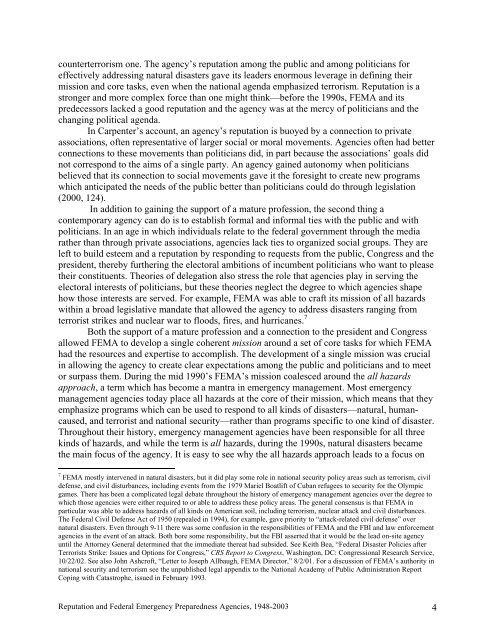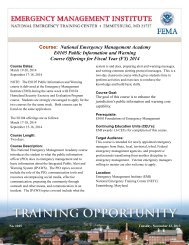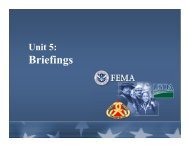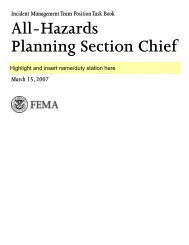Reputation and Federal Emergency Preparedness Agencies, 1948
Reputation and Federal Emergency Preparedness Agencies, 1948
Reputation and Federal Emergency Preparedness Agencies, 1948
You also want an ePaper? Increase the reach of your titles
YUMPU automatically turns print PDFs into web optimized ePapers that Google loves.
counterterrorism one. The agency’s reputation among the public <strong>and</strong> among politicians for<br />
effectively addressing natural disasters gave its leaders enormous leverage in defining their<br />
mission <strong>and</strong> core tasks, even when the national agenda emphasized terrorism. <strong>Reputation</strong> is a<br />
stronger <strong>and</strong> more complex force than one might think—before the 1990s, FEMA <strong>and</strong> its<br />
predecessors lacked a good reputation <strong>and</strong> the agency was at the mercy of politicians <strong>and</strong> the<br />
changing political agenda.<br />
In Carpenter’s account, an agency’s reputation is buoyed by a connection to private<br />
associations, often representative of larger social or moral movements. <strong>Agencies</strong> often had better<br />
connections to these movements than politicians did, in part because the associations’ goals did<br />
not correspond to the aims of a single party. An agency gained autonomy when politicians<br />
believed that its connection to social movements gave it the foresight to create new programs<br />
which anticipated the needs of the public better than politicians could do through legislation<br />
(2000, 124).<br />
In addition to gaining the support of a mature profession, the second thing a<br />
contemporary agency can do is to establish formal <strong>and</strong> informal ties with the public <strong>and</strong> with<br />
politicians. In an age in which individuals relate to the federal government through the media<br />
rather than through private associations, agencies lack ties to organized social groups. They are<br />
left to build esteem <strong>and</strong> a reputation by responding to requests from the public, Congress <strong>and</strong> the<br />
president, thereby furthering the electoral ambitions of incumbent politicians who want to please<br />
their constituents. Theories of delegation also stress the role that agencies play in serving the<br />
electoral interests of politicians, but these theories neglect the degree to which agencies shape<br />
how those interests are served. For example, FEMA was able to craft its mission of all hazards<br />
within a broad legislative m<strong>and</strong>ate that allowed the agency to address disasters ranging from<br />
terrorist strikes <strong>and</strong> nuclear war to floods, fires, <strong>and</strong> hurricanes. 7<br />
Both the support of a mature profession <strong>and</strong> a connection to the president <strong>and</strong> Congress<br />
allowed FEMA to develop a single coherent mission around a set of core tasks for which FEMA<br />
had the resources <strong>and</strong> expertise to accomplish. The development of a single mission was crucial<br />
in allowing the agency to create clear expectations among the public <strong>and</strong> politicians <strong>and</strong> to meet<br />
or surpass them. During the mid 1990’s FEMA’s mission coalesced around the all hazards<br />
approach, a term which has become a mantra in emergency management. Most emergency<br />
management agencies today place all hazards at the core of their mission, which means that they<br />
emphasize programs which can be used to respond to all kinds of disasters—natural, humancaused,<br />
<strong>and</strong> terrorist <strong>and</strong> national security—rather than programs specific to one kind of disaster.<br />
Throughout their history, emergency management agencies have been responsible for all three<br />
kinds of hazards, <strong>and</strong> while the term is all hazards, during the 1990s, natural disasters became<br />
the main focus of the agency. It is easy to see why the all hazards approach leads to a focus on<br />
7 FEMA mostly intervened in natural disasters, but it did play some role in national security policy areas such as terrorism, civil<br />
defense, <strong>and</strong> civil disturbances, including events from the 1979 Mariel Boatlift of Cuban refugees to security for the Olympic<br />
games. There has been a complicated legal debate throughout the history of emergency management agencies over the degree to<br />
which those agencies were either required to or able to address these policy areas. The general consensus is that FEMA in<br />
particular was able to address hazards of all kinds on American soil, including terrorism, nuclear attack <strong>and</strong> civil disturbances.<br />
The <strong>Federal</strong> Civil Defense Act of 1950 (repealed in 1994), for example, gave priority to “attack-related civil defense” over<br />
natural disasters. Even through 9-11 there was some confusion in the responsibilities of FEMA <strong>and</strong> the FBI <strong>and</strong> law enforcement<br />
agencies in the event of an attack. Both bore some responsibility, but the FBI asserted that it would be the lead on-site agency<br />
until the Attorney General determined that the immediate thereat had subsided. See Keith Bea, “<strong>Federal</strong> Disaster Policies after<br />
Terrorists Strike: Issues <strong>and</strong> Options for Congress,” CRS Report to Congress, Washington, DC: Congressional Research Service,<br />
10/22/02. See also John Ashcroft, “Letter to Joseph Allbaugh, FEMA Director,” 8/2/01. For a discussion of FEMA’s authority in<br />
national security <strong>and</strong> terrorism see the unpublished legal appendix to the National Academy of Public Administration Report<br />
Coping with Catastrophe, issued in February 1993.<br />
<strong>Reputation</strong> <strong>and</strong> <strong>Federal</strong> <strong>Emergency</strong> <strong>Preparedness</strong> <strong>Agencies</strong>, <strong>1948</strong>-2003 4

















